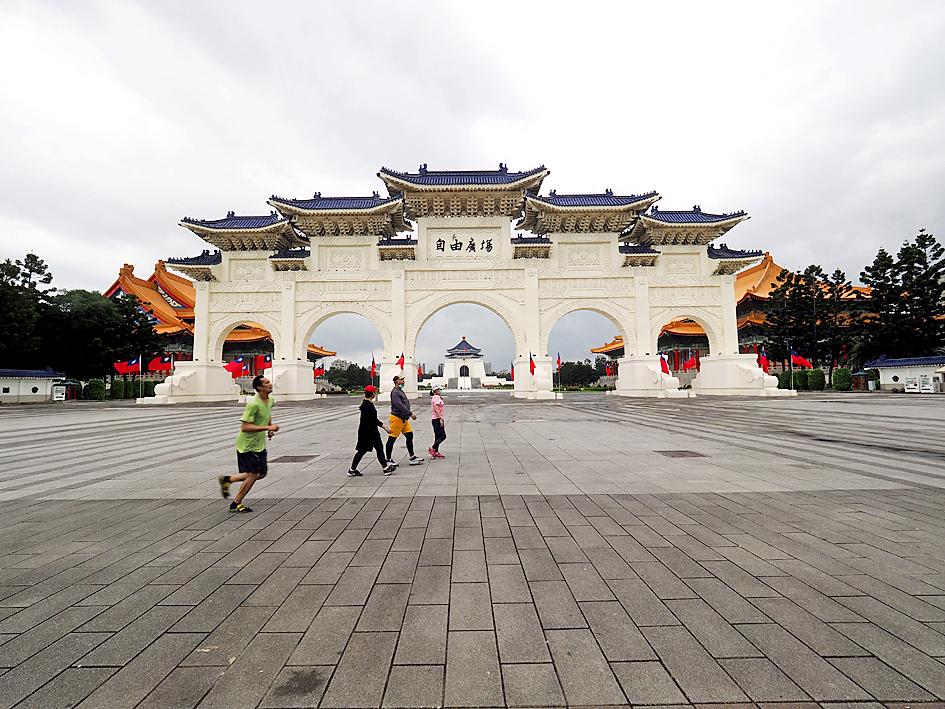The US remains the top power in the Indo-Pacific, but has suffered the biggest relative fall in its standing in the region over the past year, partly because of the loss of prestige over the mishandling of COVID-19, the Lowy Institute’s Asia Power Index shows.
Releasing the latest annual results yesterday, the Australia-based foreign policy think tank said while China’s standing had stalled, it remained in second place and was believed to be on track to match the US by the end of this decade.
Australia was one of the few countries to gain in the scores of comprehensive power this year, overtaking South Korea as the region’s sixth-most powerful country, helped by growth in its regional cultural influence and expanding defense cooperation.

Photo: David Chang, EPA-EFE
Taiwan (ranked 14th) and Vietnam (12th) were also on the rise.
“This year we’ve seen an acceleration in power shifts, but driven really more by underperformance than anything else,” project director Herve Lemahieu told the Guardian Australia. “That’s as a direct consequence of the pandemic.”
The competent handling of the COVID-19 pandemic by Taiwan, Vietnam and Australia “was a necessary, but not sole condition” for improving their regional standing, the institute report said.
The annual index aims to provide a snapshot of the shifts in influence in the fast-changing Indo-Pacific region, ranking 26 countries and territories by the overall power they wield.
The scores are based on 128 indicators, including three new indicators added this year to track perceptions of the handling of the pandemic, major ecological threats and defense dialogues.
While power shifts “happen only slowly outside of wartime,” the pandemic has triggered “a race to the bottom,” with 18 states in the Indo-Pacific region experiencing significant downward shifts in their relative power, the report said.
US President Donald Trump’s administration’s unilateral instincts was one reason why the US underachieved against its ability to wield broad-based power in Asia, it said.
“America has suffered the largest reputational hit in the region for its domestic and international handling of the COVID-19 pandemic,” the report said. “The result is a powerful reminder that legitimacy and leadership on the world stage start with the capacity of leaders to govern well at home.”
The report said that Taiwan had one of the biggest gains in diplomatic influence (+9.0), but lost the most points in resilience (-0.9). It also improved in cultural influence (+1.1), future resources (+0.8) and economic relationships (+0.4), while trending down in economic capability (-0.9), defense networks (-0.6) and military capability (-0.2).
“Taiwan exerts less influence in the region than expected given its available resources, as indicated by the country’s negative power gap score. While Taiwan is a net underachiever in Asia, its negative power gap improved in 2020,” the report said.
Additional reporting by staff writer

The CIA has a message for Chinese government officials worried about their place in Chinese President Xi Jinping’s (習近平) government: Come work with us. The agency released two Mandarin-language videos on social media on Thursday inviting disgruntled officials to contact the CIA. The recruitment videos posted on YouTube and X racked up more than 5 million views combined in their first day. The outreach comes as CIA Director John Ratcliffe has vowed to boost the agency’s use of intelligence from human sources and its focus on China, which has recently targeted US officials with its own espionage operations. The videos are “aimed at

STEADFAST FRIEND: The bills encourage increased Taiwan-US engagement and address China’s distortion of UN Resolution 2758 to isolate Taiwan internationally The Presidential Office yesterday thanked the US House of Representatives for unanimously passing two Taiwan-related bills highlighting its solid support for Taiwan’s democracy and global participation, and for deepening bilateral relations. One of the bills, the Taiwan Assurance Implementation Act, requires the US Department of State to periodically review its guidelines for engagement with Taiwan, and report to the US Congress on the guidelines and plans to lift self-imposed limitations on US-Taiwan engagement. The other bill is the Taiwan International Solidarity Act, which clarifies that UN Resolution 2758 does not address the issue of the representation of Taiwan or its people in

SHIFT: Taiwan’s better-than-expected first-quarter GDP and signs of weakness in the US have driven global capital back to emerging markets, the central bank head said The central bank yesterday blamed market speculation for the steep rise in the local currency, and urged exporters and financial institutions to stay calm and stop panic sell-offs to avoid hurting their own profitability. The nation’s top monetary policymaker said that it would step in, if necessary, to maintain order and stability in the foreign exchange market. The remarks came as the NT dollar yesterday closed up NT$0.919 to NT$30.145 against the US dollar in Taipei trading, after rising as high as NT$29.59 in intraday trading. The local currency has surged 5.85 percent against the greenback over the past two sessions, central

US Indo-Pacific Commander Admiral Samuel Paparo on Friday expressed concern over the rate at which China is diversifying its military exercises, the Financial Times (FT) reported on Saturday. “The rates of change on the depth and breadth of their exercises is the one non-linear effect that I’ve seen in the last year that wakes me up at night or keeps me up at night,” Paparo was quoted by FT as saying while attending the annual Sedona Forum at the McCain Institute in Arizona. Paparo also expressed concern over the speed with which China was expanding its military. While the US